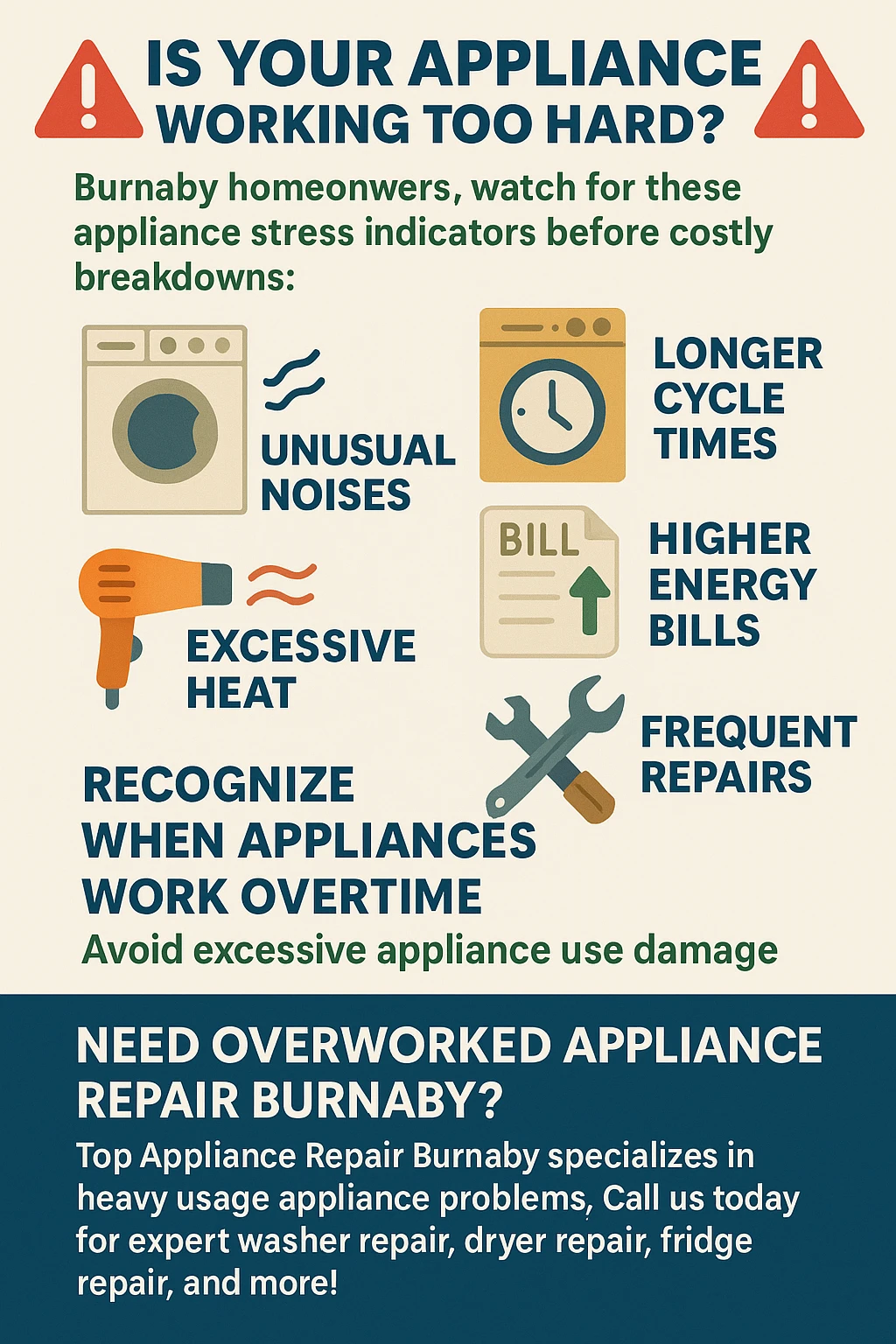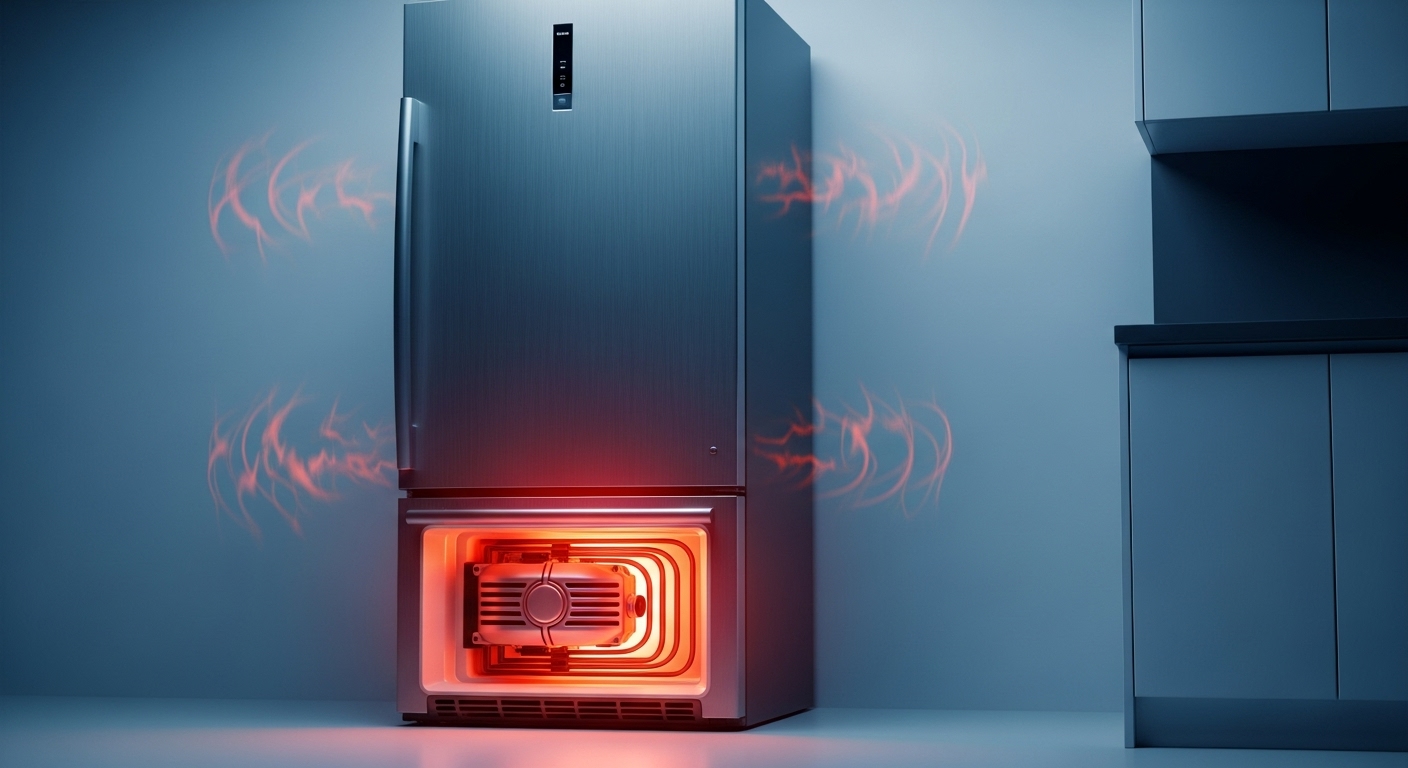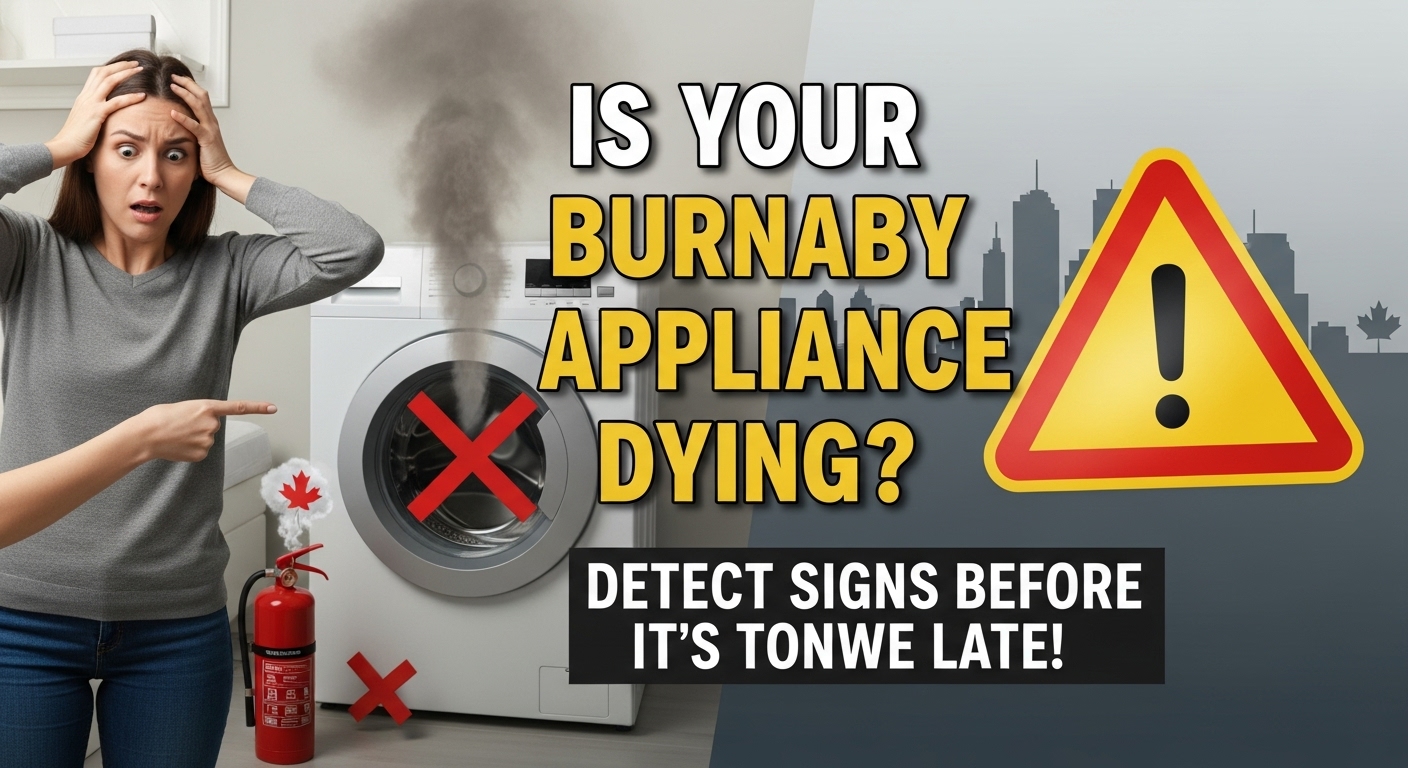Wondering why your washing machine has been making that grinding noise, or why your dryer takes twice as long to finish a load? Your appliances might be sending you distress signals that could save you thousands in emergency repairs if you know what to look for. Picture this: it’s a typical Tuesday evening in Burnaby, and you’re trying to tackle the week’s laundry when your washing machine starts making sounds like a construction site. Or maybe you open your dishwasher after what should have been a complete cycle, only to find your dishes still grimy and your glasses spotted. These aren’t just minor inconveniences – they’re your appliances crying for help before they break down completely. Living in Burnaby means dealing with unique challenges that put extra stress on our household equipment. The coastal humidity, frequent power fluctuations during storm season, and those scorching heat dome events we’ve been experiencing all create the perfect storm for appliance burnout. What’s particularly frustrating is that most of these expensive breakdowns are totally preventable if you catch the warning signs early enough. The truth is, appliances don’t just suddenly die on us. They spend weeks or even months sending out distress signals through strange noises, performance changes, and energy consumption spikes. Understanding these warning signs isn’t just about saving money on repairs – it’s about maintaining the comfortable home environment your family depends on every single day. [IMAGE PLACEHOLDER FOR IMAGE1]
Key Outtakes:
- Regular appliance health checks can prevent 80% of unexpected breakdowns and extend appliance lifespan by up to 50%
- Strange noises, performance drops, and increased energy bills are the three most reliable early warning signs
- Professional appliance inspections every 6-12 months can save hundreds of dollars in repair costs
- Simple monthly maintenance tasks can significantly improve appliance efficiency and prevent major failures
- Ignoring early warning signs often leads to safety hazards and more expensive replacements

Understanding Appliance Burnout and Overworking Signs

Before we dive into the specific warning signs, let’s talk about what actually happens when appliances start working too hard. Think of your household equipment like athletes – they can push themselves for a while, but eventually, overexertion catches up with them. When your washing machine, dryer, or dishwasher consistently operates beyond its design limits, every component experiences stress that builds up over time. [IMAGE PLACEHOLDER FOR IMAGE2] Research shows that most appliance failures don’t happen overnight – they’re the result of gradual wear that accelerates when machines are forced to work harder than they should. Your refrigerator’s compressor running constantly to maintain temperature, your dryer taking multiple cycles to get clothes dry, or your dishwasher struggling to clean properly are all signs of equipment operating under duress. Here in Burnaby, our coastal climate adds another layer of complexity to appliance health. The humidity levels we experience throughout the year can cause internal components to work harder, while summer heat waves put additional strain on cooling systems. During those brutal heat dome events, your air conditioner and refrigerator are essentially running a marathon in desert conditions. Power grid instability during peak demand periods also creates voltage fluctuations that stress appliance motors and electronic controls. What makes appliance burnout particularly sneaky is how it mimics normal aging. That slightly louder hum from your fridge, the dishwasher cycle that takes a bit longer than usual, or the dryer that needs an extra ten minutes – these changes happen so gradually that most people adapt to them rather than recognizing them as warning signs. By the time the problem becomes undeniable, you’re often looking at a repair bill that costs more than prevention would have. The economic reality hits hard when you consider that emergency appliance repairs during peak failure seasons can cost two to three times more than routine maintenance. When your air conditioner dies during a heat wave, or your washing machine floods the laundry room on a weekend, you’re not just paying for parts and labor – you’re paying premium rates for urgent service when demand is highest.
The Top Warning Signs Your Appliances Need Immediate Attention

Now that we understand the mechanics of appliance burnout, let’s get into the specific signals your equipment sends when it’s struggling. Think of yourself as a appliance detective – the clues are all there, you just need to know how to read them. The beautiful thing about early detection is that it puts you back in control of the situation, allowing you to schedule repairs at your convenience rather than dealing with emergency breakdowns.
Strange Noises and Vibrations

Let’s start with the most obvious warning signs – weird sounds coming from your appliances. Every appliance has its normal operational soundtrack, and when that changes, it’s time to pay attention. Thumping sounds from washers may mean an unbalanced load or worn bearings. Buzzing from a fridge could signal a compressor problem. Squealing from dryers often points to a bad belt or motor. [IMAGE PLACEHOLDER FOR IMAGE3] I learned this the hard way when my washing machine started making a sound like a helicopter landing in my basement. I kept telling myself it was just “getting old,” but what could have been a $200 repair became a $600 replacement because I ignored it for months. Don’t make the same mistake I did. Vibrations are equally telling. If your dryer suddenly starts doing a dance across the laundry room floor, or your dishwasher is shaking the entire kitchen cabinet, something’s definitely not right. These movement patterns usually indicate internal component wear or improper installation issues that have developed over time. The key is distinguishing between normal operational sounds and concerning changes. New homeowners often worry about every little noise, while longtime residents might become so accustomed to gradual changes that they miss important warning signs. Take a moment each month to actually listen to your appliances during their cycles. Yes, I know it sounds weird, but this simple practice can save you thousands.
Performance Degradation and Efficiency Drops
Performance issues are often the first signs that your appliances are struggling, but they’re also the easiest to dismiss or compensate for. When your dishwasher used to get everything sparkling clean and now you’re finding spots on glassware, that’s not just hard water – it could be a failing heating element or pump issue. If your dryer cycles are taking longer than usual, don’t just assume it’s the type of clothes you’re washing. Refrigerator performance issues are particularly tricky because they happen gradually. You might not notice that your milk is expiring a day earlier than it used to, or that ice cream is slightly softer than normal. But these subtle changes often indicate temperature regulation problems that, left unchecked, can lead to compressor failure. For washing machines, watch for clothes that aren’t getting as clean as they used to, or fabric that comes out with a musty smell even after a full wash cycle. These issues can indicate problems with water temperature, drainage, or detergent dispensing systems. Don’t just switch to a stronger detergent and call it good – investigate the root cause. The tricky part about performance decline is that we unconsciously adapt to it. We start using higher temperature settings on the dishwasher, running the dryer for longer cycles, or turning down the refrigerator temperature to compensate. These adaptations might temporarily mask the problem, but they actually accelerate the underlying burnout by forcing the appliance to work even harder.
Unusual Odors and Smells
Your nose is one of your best diagnostic tools when it comes to appliance health. A burning smell from an appliance can indicate overheating or electrical issues, which can be dangerous and should be addressed immediately. But not all concerning smells are that dramatic. Sometimes it’s a subtle metallic odor from your dishwasher, or a slightly musty smell from your washing machine that indicates brewing problems. Gas appliances deserve special attention in the smell department. Any hint of gas odor around your stove, dryer, or water heater should trigger an immediate response: turn off the appliance, ventilate the area, and call a professional. Don’t try to troubleshoot gas issues yourself – the risks are just too high. Refrigerators can develop interesting smells that aren’t related to forgotten leftovers. A chemical or “hot” smell often points to an overheating compressor or issues with the defrost system. Don’t just stick an open box of baking soda in there and hope for the best – get it checked out.
FAQs About Appliance Warning Signs
- How often should I have my appliances professionally inspected? For most major appliances like refrigerators, washers, dryers, and dishwashers, a professional inspection every 12 to 18 months is a good rule of thumb. For high-use items or older models, you might consider an annual check-up.
- Can I fix these warning signs myself? Some issues, like cleaning a refrigerator’s condenser coils or leveling a washing machine, are simple DIY tasks. However, anything involving electrical components, gas lines, or sealed systems should always be left to a certified technician.
- What’s the most dangerous appliance warning sign? Any smell of gas or a persistent burning smell from an electrical appliance are the most critical warning signs. These indicate immediate fire or explosion hazards and require you to stop using the appliance and call for professional help right away.
- Do newer “smart” appliances give better warning signs? Yes, many smart appliances can self-diagnose and send alerts to your phone before a major failure occurs. They might tell you a filter needs changing or that a component is operating outside of normal parameters, giving you a significant head start on maintenance.
- Is it more cost-effective to repair or replace an aging appliance? A good guideline is the “50 percent rule.” If your appliance is more than halfway through its expected lifespan and the cost of repair is more than 50% of the cost of a new one, replacement is usually the better long-term investment.
Wrapping Up
Your home appliances work hard to keep your life running smoothly, but they can’t tell you when they’re in trouble – at least not in words. Learning to interpret their warning signs is the single most effective thing you can do to prevent catastrophic breakdowns, save money, and ensure your home remains a safe, comfortable space. Don’t wait for a flood in the laundry room or a refrigerator full of spoiled food to take action. Pay attention to the sights, sounds, and smells of your appliances. If you’re in Burnaby and notice any of these warning signs, don’t hesitate. A timely professional inspection can mean the difference between a minor adjustment and a major replacement. Your wallet – and your peace of mind – will thank you for it.
